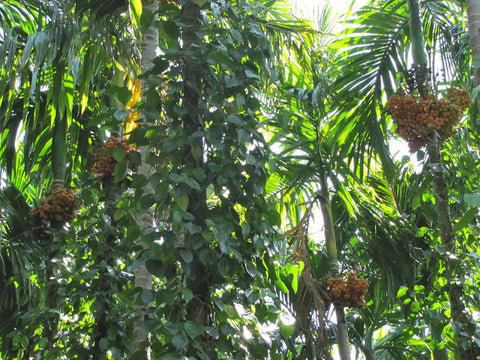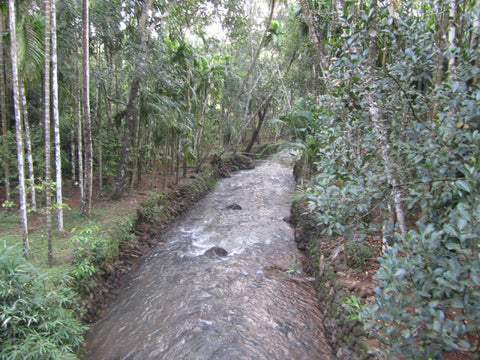Farm Visits October 13 2013 1 Comment
A large part of our ‘learning’ about agricultural practice has been through ‘farm-visits’.

Shy little kids watching their father take us around his farm
There is quite a Green-Organic movement here and most local farmers are very willing and happy to share their knowledge and experiences, the language-barrier notwithstanding. They happily explain in kannada as they take us around their farms and the visit always ends with the curious question “Why did you leave a city like Bombay and come here?”.
Taking us around the farm
The Organic farmers mostly use the standard composting method since they invariably have a small herd of cows.
The compost pit behind the cow shed just topped with a layer of dry leaves
The variety of crops grown is also similar across this area – Arecanut and coconut intercropped with Black pepper, Bananas, Pine-apples and the occasional Vanilla.
Yet each farm visit shows us something different, opens our eyes to things which we never knew before and could never hope to find even in a million google searches. The hardiness, perseverance and resilience of these simple folk is worth admiring. While we lament about small inconveniences, these people take daunting events in their stride. One farm that we visited was located in the forests enroute to Sirsi. About 12 kms from the tiny village of Katgaal, the young lad Vishwanath who helps his dad to manage the land was enthusiastic about our visit. As he took us around right to the edge of his farm which was several levels lower than where we had begun, I noticed all the pineapple plants looking battered. The ground too was much squelchier in the lower level. When I asked him about it, he pointed to a swiftly flowing beautiful stream just beyond the boundary of his farm.
Swiftly flows this stream
He explained that after every heavy rain the water in the stream rises and floods his land. The arecanut plants are not too badly affected but the smaller ones are. And hence he could not use the lower levels of his land for any other intercropping. It was sad because there could have been a good source of income from the intercropped plants. I asked him about his education – he could only study till 4th standard as the closest school offers only that. Beyond that, he would have to either move to a relatives house or shell out almost 25 rupees a day - bus fare for the 30 km journey - something that they could ill afford. Yet his sparkling humour and happy nature shone through. I asked about the bus connectivity to his farm. “Like Doctors medicine – 3 times a day – morning noon and night” he laughed. His knowledge about vanilla cultivation, medicinal plants and herbal pesticides was amazing. We returned with a wealth of knowledge and a large collection of plants, saplings and cuttings for our farm.
The other noteworthy visit was to a farm in the fairly developed village of Sorab near Sagar (of the Jog Falls fame). Here the father and son duo manage their farm without any outside help and have been mentioned in local Kannada newspapers as the “Ideal Organic farm”. The 72 year old father is one of the first to convert his farm to totally Organic. He is passionate about Jeevamruth – the best fertilizer for plants and agreed to explain the procedure on condition that we actually put it into practice. “I am fed up of people coming and asking me out of curiosity and then totally forgetting what I have said” he lamented. But I was ready with my notebook and pen and had a most interesting biology lecture on the merits of helpful soil microbes, and creating the perfect liquid fertilizer which allows these very microbes to multiply exponentially thus enriching the soil and eliminating the need for chemical fertilizers and pesticides. As we discussed I was amazed to know that he had attended one of Masanobu Fukuoka’s Lecture Demonstrations and also read his book “One straw revolution” which has been translated into kannada. As we walked around his farm, we understood the true meaning of ‘Sustainability’, how a sprightly 72 year old who has seen his land turn fallow with chemical fertilizers succeeded in turning it around into a green Organic-Certified Wonder!





Comments
Rita on October 28 2014 at 06:31AM
Tanuja, you are amazing. You write so well. How nicely you describe everything. I fall short of words to express my admiration for you. You should write a book about your experiences. I am sure it would make a bestseller.